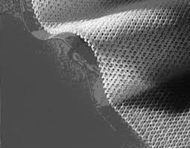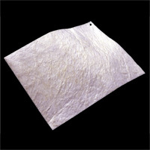There are many types of mesh on the market and the choice will often boil down to surgeon preference and experience in using that type of mesh. Choice of mesh will also depend on whether active infection is present. Mesh falls into two main categories.
Synthetic mesh

Parietex™ from Covidien
These meshes are made of nylon or polyester often coated with a dissolving material that can make these types of mesh safer to place in contact with the bowel. There are many different brands of mesh and one is not generally more effective than another.
Biologic mesh

Cook Medical Surgisis® Biologic Mesh
This type of mesh is made from highly purified animal products – usually pig and are mainly used in infected wounds.
What are the Pros and Cons of Mesh?
There is no doubt that using mesh has revolutionised the hernia repair. For most large hernias the surgery will fail without it. This is because the reasons that the hernia occurred in the first place are still usually present after the operation. The weakened scar will pull apart again and the mesh is there to act as a bolster to bridge the gap in the scar when it inevitably occurs.
Mesh however, has its fair share of problems. Infection in the main one. Once bacteria attach themselves to mesh, antibiotics will not help and the mesh will need to be removed. Mesh can also erode into adjacent organs like the bowel, bladder and skin and cause holes to form. This can be a difficult problem to manage.
